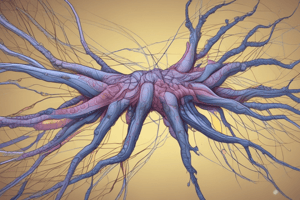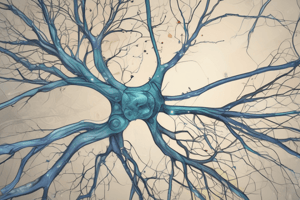Podcast
Questions and Answers
Explain the significance of motor control in organisms with a nervous system.
Explain the significance of motor control in organisms with a nervous system.
Motor control is crucial for regulating movements, including conscious voluntary movements, subconscious muscle memory, involuntary reflexes, and instinctual taxis. It integrates sensory information and elicits signals to recruit muscles for goal-oriented movements, posture, balance, and stability.
What is the role of the nervous system in controlling movement?
What is the role of the nervous system in controlling movement?
The nervous system integrates multimodal sensory information and elicits signals to recruit muscles for carrying out movements and goals, as well as for posture, balance, and stability.
What are the computational challenges discussed under the term sensorimotor control?
What are the computational challenges discussed under the term sensorimotor control?
The computational challenges include multisensory integration, signal processing, coordination, biomechanics, and cognition.
Why do some researchers argue that motor control is the reason brains exist?
Why do some researchers argue that motor control is the reason brains exist?
What is the relationship between motor neurons and muscle force production?
What is the relationship between motor neurons and muscle force production?
Flashcards are hidden until you start studying
Study Notes
Motor Control in Organisms
- Motor control is crucial in organisms with a nervous system, as it enables them to interact with their environment, respond to stimuli, and perform essential functions like movement, balance, and posture.
Role of Nervous System in Motor Control
- The nervous system plays a central role in controlling movement by transmitting and processing signals between the central nervous system (CNS), peripheral nervous system (PNS), and muscles.
- The nervous system integrates sensory information from the environment and the organism's internal state to generate motor responses.
Sensorimotor Control Challenges
- Sensorimotor control refers to the complex process of integrating sensory information with motor responses.
- Computational challenges in sensorimotor control include:
- Sensory uncertainty and noise
- Motor redundancy (multiple ways to achieve the same movement)
- Real-time processing requirements
- Adaptation to changing environments and internal states
Motor Control and Brain Evolution
- Some researchers argue that motor control is the primary reason brains evolved, as it enables organisms to interact with their environment and respond to threats or opportunities.
- The development of complex motor control systems may have driven the evolution of larger, more complex brains.
Motor Neurons and Muscle Force Production
- Motor neurons transmit signals from the CNS to muscles, controlling muscle force production.
- The strength and timing of motor neuron activation determine the force and velocity of muscle contractions.
- Precise control of motor neurons is essential for coordinated and efficient movement.
Studying That Suits You
Use AI to generate personalized quizzes and flashcards to suit your learning preferences.




